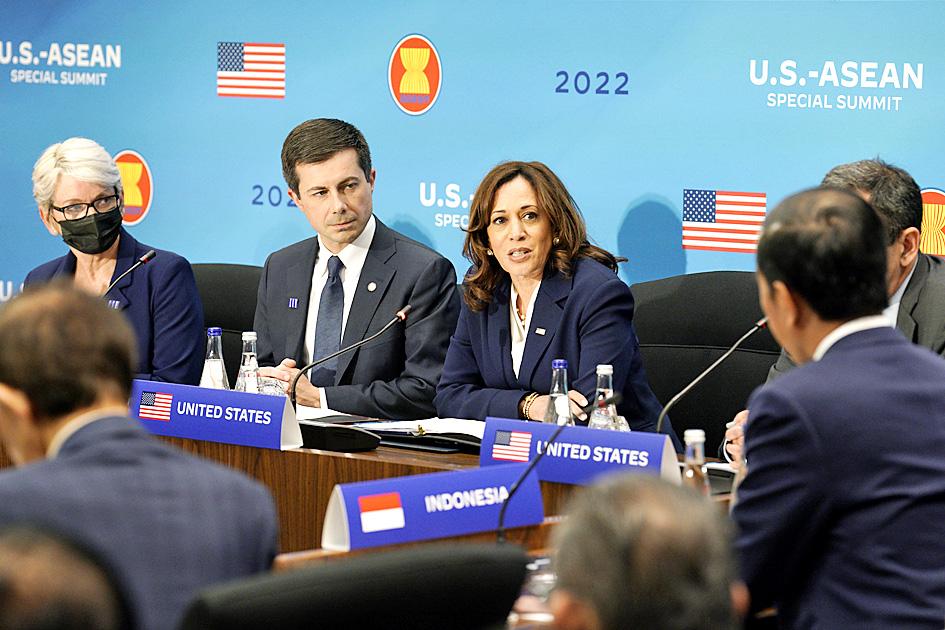US President Joe Biden on Friday said a first summit in Washington with ASEAN leaders marked the launch of a “new era” in the relationship between the US and the 10-nation bloc.
In a joint 28-point “vision statement” after a two-day meeting, the two sides took what analysts called a symbolic step of committing to raise their relationship from a strategic partnership to a “comprehensive strategic partnership” in November.
On Ukraine they reaffirmed “respect for sovereignty, political independence, and territorial integrity,” wording that a regional expert said went further than past ASEAN statements.

Photo: Bloomberg
The statement did not condemn Russia by name for its Feb. 24 invasion of Ukraine.
The summit marked the first time ASEAN leaders gathered as a group in Washington, and their first meeting hosted by a US president since 2016.
Biden’s administration hopes the effort will show that the US remains focused on the Indo-Pacific and the long-term challenge of China, which it views as its main competitor, despite Russia’s invasion of Ukraine.
He was also hoping to persuade ASEAN countries to toughen their stance on Russia’s invasion.
Biden told the ASEAN leaders that “a great deal of history of our world in the next 50 years is going to be written in the ASEAN countries, and our relationship with you is the future, in the coming years and decades.”
Biden called the US-ASEAN partnership “critical” and said: “We’re launching a new era — a new era — in US-ASEAN relations.”
US Vice President Kamala Harris said the US would remain in Southeast Asia for “generations,” while stressing the need to maintain freedom of the seas, which the US says is challenged by China.
“The United States and ASEAN have shared a vision for this region, and together we will guard against threats to international rules and norms,” Harris said.
Neither she nor Biden mentioned China by name.
Harris said Washington would continue to respond with ASEAN to the threat of COVID-19, having already donated more than 115 million vaccine doses to the region, adding that both sides need to show collective ambition on climate change, accelerate the transition to clean energy and meet infrastructure needs sustainably.
Biden also announced the nomination of US National Security Council Chief of Staff and Executive Secretary Yohannes Abraham to be ambassador to ASEAN, filling a post vacant since the start of then-US president Donald Trump’s administration in 2017.

A car bomb killed a senior Russian general in southern Moscow yesterday morning, the latest high-profile army figure to be blown up in a blast that came just hours after Russian and Ukrainian delegates held separate talks in Miami on a plan to end the war. Kyiv has not commented on the incident, but Russian investigators said they were probing whether the blast was “linked” to “Ukrainian special forces.” The attack was similar to other assassinations of generals and pro-war figures that have either been claimed, or are widely believed to have been orchestrated, by Ukraine. Russian Lieutenant General Fanil Sarvarov, 56, head

SAFETY FIRST: Double the number of police were deployed at the Taipei Marathon, while other cities released plans to bolster public event safety Authorities across Taiwan have stepped up security measures ahead of Christmas and New Year events, following a knife and smoke bomb attack in Taipei on Friday that left four people dead and 11 injured. In a bid to prevent potential copycat incidents, police deployments have been expanded for large gatherings, transport hubs, and other crowded public spaces, according to official statements from police and city authorities. Taipei Mayor Chiang Wan-an (蔣萬安) said the city has “comprehensively raised security readiness” in crowded areas, increased police deployments with armed officers, and intensified patrols during weekends and nighttime hours. For large-scale events, security checkpoints and explosives

PUBLIC SAFETY: The premier said that security would be tightened in transport hubs, while President Lai commended the public for their bravery The government is to deploy more police, including rapid response units, in crowded public areas to ensure a swift response to any threats, President William Lai (賴清德) said yesterday after a knife attack killed three people and injured 11 in Taipei the previous day. Lai made the remarks following a briefing by the National Police Agency on the progress of the investigation, saying that the attack underscored the importance of cooperation in public security between the central and local governments. The attack unfolded in the early evening on Friday around Taipei Main Station’s M7 exit and later near the Taipei MRT’s Zhongshan

REBUFFED: In response to Chinese criticism over recent arms sales, Washington urged Beijing to engage in meaningful dialogue instead of threats and intimidation Washington’s long-term commitment to Taiwan would not change, the US Department of State said yesterday, urging Beijing to stop pressuring Taiwan and engage in meaningful bilateral dialogues. The remarks came in response to a backlash from Beijing about Washington’s latest approval of arms sales to Taiwan. The US Defense Security Cooperation Agency said in a statement on Wednesday that the Taipei Economic and Cultural Representative Office in the US has asked to purchase an arms package, including Tactical Mission Network Software; AH-1W helicopter spare and repair parts; M109A7 self-propelled howitzers; HIMARS long range precision strike systems; tube-launched, optically tracked, wire-guided missiles; Javelin